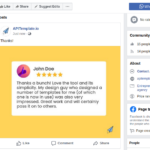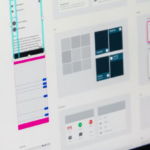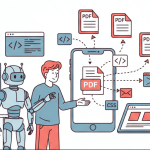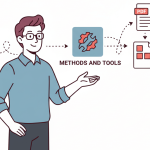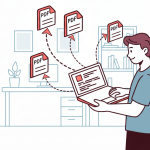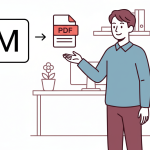Generating PDF documents manually can be time-consuming and error-prone, especially if you’re doing it regularly for reports, invoices, certificates, or contracts. With the right tools, you can automate this entire process, saving hours of work every month while reducing errors and ensuring brand consistency.

In this guide, you’ll learn how to automate PDF generation using n8n, a low-code workflow automation tool, and APITemplate.io, a powerful PDF generation API.
Whether you’re building internal reports, legal contracts, or customer-facing documents, this tutorial will walk you through each step.
What is n8n?
If you’re new to automation platforms or looking for a robust alternative to tools like Zapier or Integromat, n8n is a powerful option worth exploring. It empowers developers, operations teams, and even non-technical users to streamline processes, eliminate repetitive tasks, and integrate services without writing complex scripts.
n8n (“nodemation”) is an open-source, low-code platform that allows you to build complex workflows with over 300 integrations.
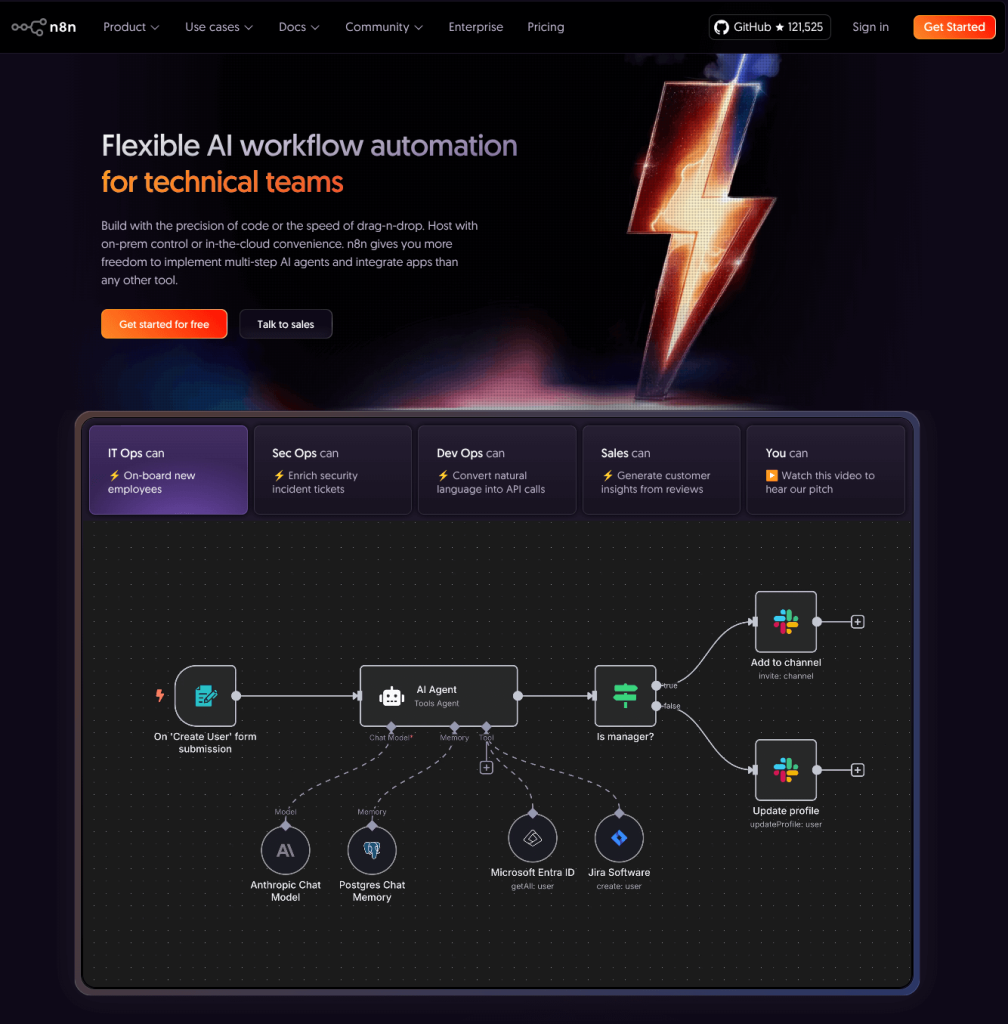
You can connect to databases, APIs, webhooks, SaaS apps, and more. With n8n, you don’t need to write scripts to connect different systems and you can build automations using its visual editor.
Some key features of n8n:
- Visual Workflow Editor: Build and connect workflows with a drag-and-drop UI.
- Custom Code Support: Use JavaScript functions when needed for logic and transformation.
- Self-host or Cloud: Host on your server or use n8n Cloud for convenience.
- Scalable & Extensible: Perfect for both simple tasks and complex automation pipelines.
Thanks to its open-source nature and large integration library, n8n is especially well-suited for building personalized and cost-effective automations. When combined with APITemplate.io, it becomes a central hub for data transformation and document generation, offering end-to-end workflow control.
What is APITemplate.io?
APITemplate.io is a PDF generation and image generation API designed for developers, marketers, and operations teams that need to dynamically produce documents at scale. Whether you need to create customized invoices, generate data-rich reports, or deliver visually branded certificates, APITemplate.io helps you do so efficiently using API-driven workflows.
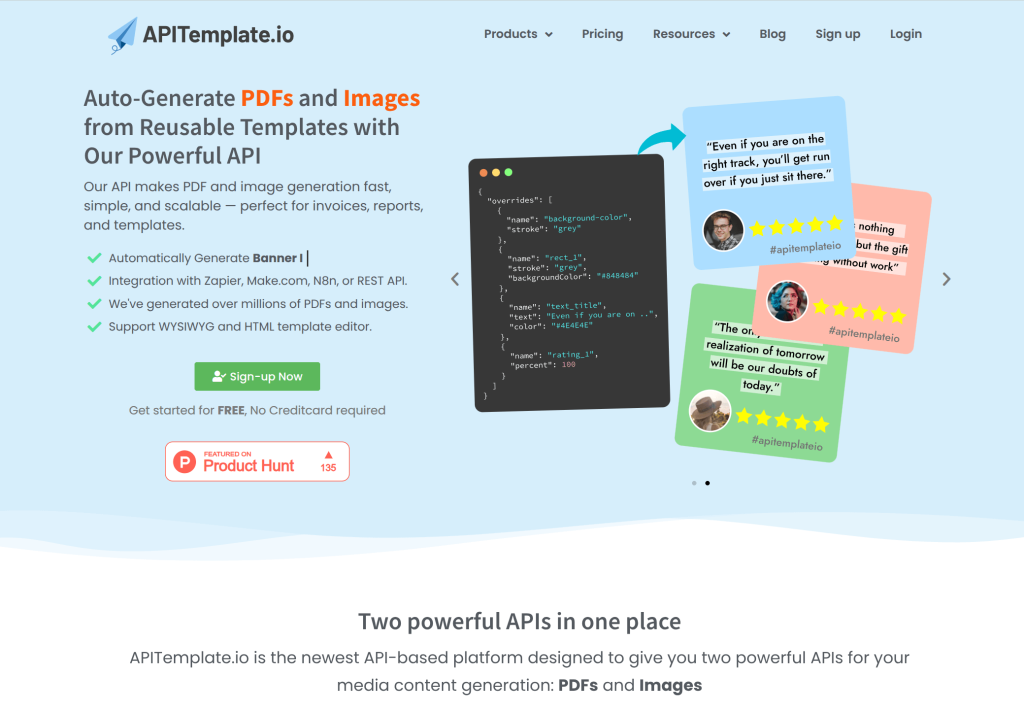
One of the biggest advantages of APITemplate.io is its flexibility. You can design templates using a drag-and-drop editor or write full HTML and CSS for pixel-perfect designs. It supports dynamic content insertion through JSON payloads, making it ideal for automation platforms like n8n.
You can send JSON data to populate templates with real-time content. Features include:
- WYSIWYG or HTML template editor
- Support for variables and looping (great for lists and tables)
- Built-in support for QR codes, barcodes, charts, and conditional rendering
- Regional servers (US, EU, SG, AU), please learn more at our API reference.
- REST API access for automation
- Integration-ready with tools like Zapier, Make.com, Bubble, and of course, n8n
With APITemplate.io, teams can eliminate the repetitive burden of manual document creation while maintaining high levels of design consistency and reliability.
Why Use n8n and APITemplate.io Together?
With automation becoming increasingly important for efficiency and accuracy, integrating a visual workflow tool like n8n with a dynamic document engine such as APITemplate.io unlocks powerful capabilities. Instead of manually formatting PDFs or relying on patchy scripts, this integration allows you to construct clean, repeatable, and responsive document workflows.
Combining these two platforms gives you the flexibility to:
- Automate recurring document generation processes such as monthly reports, contracts, and compliance documents
- Personalize documents based on user inputs or external data sources like databases, CRMs, or form submissions
- Eliminate human error in formatting and content entry by using structured templates and logic-driven workflows
- Build multi-step automations with data fetching, transformation, and delivery using conditional logic, loops, and branching
- Respond instantly to real-time events such as customer signups, orders, or feedback forms
- Connect with third-party tools like Google Sheets, Stripe, or Airtable to make dynamic document creation seamless
Common use cases include:
- Monthly sales or inventory reports with live data from your internal database
- On-demand invoices for e-commerce platforms triggered by payment gateways like Stripe or PayPal
- Auto-generated certificates for course completions, webinars, or workshops, delivered instantly via email
- Custom proposal or quote documents for B2B sales, dynamically filled with client-specific data
- Employee onboarding packages or contracts based on HR submissions
- Legal documents that adapt to input variables like location, duration, or price
Step 1: Create a PDF Template in APITemplate.io
- Sign up for an account at apitemplate.io.
- Go to “Templates” and create a new PDF Template.
- Choose between the Visual Editor or HTML Editor.
- Define variables like
{{name}},{{invoice_number}}, or loops such as{{#each items}}. - Save the template and take note of the Template ID.
- Copy your API key from the dashboard.
Make sure your variables are well structured. For example, if you are creating an invoice, you might want to include variables such as {{due_date}}, {{total}}, and an array of items.
Step 2: Set Up APITemplate Credentials in n8n
- Open your n8n instance.
- Go to Credentials > New Credential > search for APITemplate.io.
- Choose API Key and paste the key from your APITemplate dashboard.
- Save the credentials.
Having credentials stored securely in n8n allows you to reuse them across multiple workflows.
Step 3: Build the Workflow in n8n
i. Trigger the Workflow
Choose one of the following depending on your use case:
- Manual Trigger: For testing.
- Cron Trigger: For recurring PDFs (e.g., weekly reports).
- Webhook Trigger: For on-demand generation (e.g., form submissions).
- App-Based Triggers: React to changes in tools like Airtable, Stripe, or Google Forms.
ii. Collect and Prepare Data
Use nodes like:
- HTTP Request to fetch data from an API
- MySQL/PostgreSQL to query a database
- Google Sheets to retrieve spreadsheet data
- Function/Set Node to shape your JSON to match the template variables
Example JSON:
{
"name": "Jane Doe",
"invoice_number": "INV-1001",
"items": [
{"description": "Widget A", "price": 25},
{"description": "Widget B", "price": 45}
],
"total": 70,
"due_date": "2025-07-31"
}
iii. Method 1: Generate the PDF(with N8n Node)
Add an APITemplate.io node:
- Operation: PDF → Create
- Use your saved credential
- Set the Template ID
- Paste your JSON into the data field
* Please take note that the N8n node currently using our V1 API.
iii. Method 2: Generate the PDF(Http Request Node)
To take advantage of V2’s performance improvements and new feartures, we recommend using an HTTP Request node instead. You can find more details in our V2 API reference here.
To use an HTTP Request node, the followings are the settings:
- Method:
POST - URL:
https://rest.apitemplate.io/v2/create-pdfand you can use the other regional endpoints for PDF generartion - Parameters: template_id and additional parameter can be found here
- Authentication: Generic Credential Type
- Generic Auth Type: Header Auth
- Header Auth: Header Auth account
- Headers:
X-API-KEY: YOUR_KEY
- Headers:
- Body: Raw JSON
The response will include a download_url to access the generated PDF. You can view this URL in the execution log or pass it forward in the workflow.
Sample HTTP Request Node
Here is the HTTP node sample and you may copy all the text content (Ctrl + C), then go to your N8n workflow and paste it there (Ctrl + V).
{
"nodes": [
{
"parameters": {
"method": "POST",
"url": "https://rest.apitemplate.io/v2/create-pdf",
"authentication": "genericCredentialType",
"genericAuthType": "httpHeaderAuth",
"sendQuery": true,
"queryParameters": {
"parameters": [
{
"name": "template_id",
"value": "dd077b3e1e635eacc"
},
{
"name": "expiration",
"value": "5"
}
]
},
"sendBody": true,
"specifyBody": "json",
"jsonBody": "{\n \"batchNumber\": \"736628\",\n \"revision\": \"0\",\n \"header_title\": \"This is a dynamic header\",\n \"website\": \"https://apitemplate.io\",\n \"document_id\": \"889856789012\",\n \"items\": [\n {\n \"item_name\": \"Product 1\",\n \"qty\": 10,\n \"unit_price\": 3\n },\n {\n \"item_name\": \"Product 2\",\n \"qty\": 3,\n \"unit_price\": 4\n },\n {\n \"item_name\": \"Product 3\",\n \"qty\": 10,\n \"unit_price\": 3\n },\n {\n \"item_name\": \"Product 4\",\n \"qty\": 20,\n \"unit_price\": 5\n }\n ]\n}",
"options": {}
},
"type": "n8n-nodes-base.httpRequest",
"typeVersion": 4.2,
"position": [
-340,
-100
],
"id": "0ced6f1a-276c-4af5-b40f-aac5387b5174",
"name": "HTTP Request",
"credentials": {
"httpHeaderAuth": {
"id": "",
"name": "Header Auth account"
}
}
}
],
"connections": {},
"pinData": {},
"meta": {
"instanceId": ""
}
}
Next, set up authentication as follows for the node:
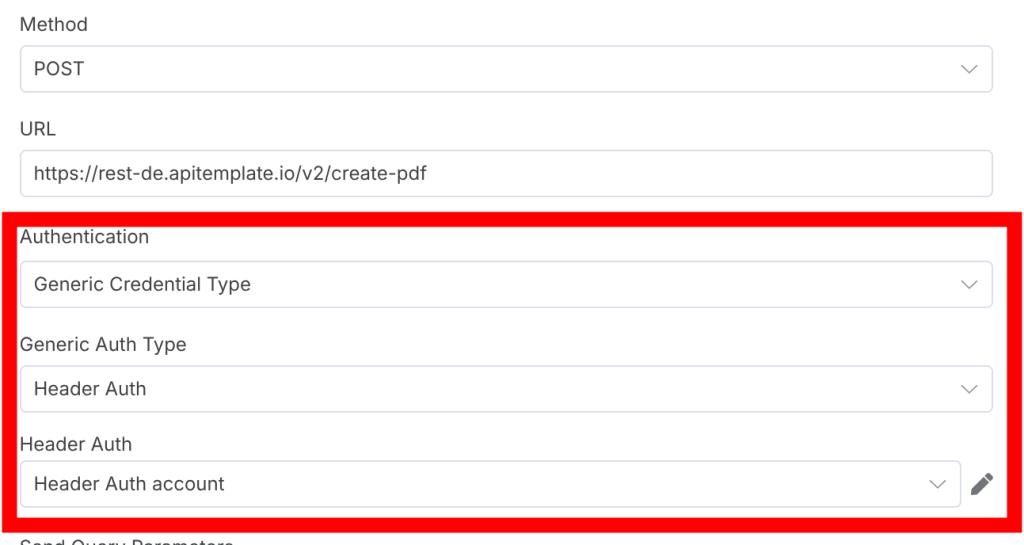
For header authentication, use “X-API-KEY” as the name and enter your API key.

Then set the template_id in the parameters(You may find additional parameters in our API reference) and assign your own JSON data to the JSON field and you’re all set.
iv. Download or Share the PDF
Use an HTTP Request node to GET the file. Then:
- Send it via email using the Gmail or SMTP node
- Upload it to Google Drive, Dropbox, or Amazon S3
- Return the link via Webhook Response for front-end integration
You can even store metadata in Notion or Airtable alongside the generated document.
Advanced Tips
Asynchronous PDF Generation
If you’re generating large files, APITemplate supports asynchronous processing. Add a webhook_url to your request, and APITemplate will notify your n8n webhook once the file is ready. This is especially helpful for long-running jobs and can prevent timeouts in client applications.
Debugging Workflows
Creating automated document generation workflows can involve multiple data sources, external APIs, and conditional logic—so debugging effectively is critical. n8n offers built-in tools to help you identify issues quickly and optimize your workflow performance.
- Use Manual Executions to test each node and view live output during development.
- Pin Data in nodes to simulate results without re-fetching, saving time during testing.
- Use Execute Step to isolate and test one node at a time, especially useful when troubleshooting failures or unexpected behavior.
- Leverage Logs and Error Handling to catch API failures, monitor payloads, and add retry logic using error branches.
Incorporating these techniques ensures your workflows are reliable, resilient, and ready for production.
Version Control
As your workflows and templates evolve, maintaining consistency across development, staging, and production is essential. Version control strategies help reduce deployment risks and enable collaboration across teams.
- Use environment variables in n8n to manage template IDs, credentials, and endpoint URLs across multiple environments.
- Keep a backup of your APITemplate HTML or JSON templates for version tracking, rollback, or sharing with your team.
- Document any changes to workflows and templates to maintain a clear history of updates and their rationale.
By versioning both your automation logic and design templates, you ensure smoother updates and greater confidence in your deployment processes.
Security & Compliance
When automating business-critical documents like contracts or financial records, security and compliance should be a top priority. Both n8n and APITemplate.io offer robust features to support secure workflows:
- n8n provides:
- End-to-end encryption to protect sensitive data during transmission
- Credential encryption at rest, ensuring secrets are safely stored
- Role-based access control (RBAC) to restrict who can edit or view workflows
- APITemplate.io supports:
- TLS encryption for secure API communications
- Regional processing options (US, EU, Singapore, Australia) to support data residency requirements
- GDPR compliance, making it suitable for handling personal data in regulated environments
Together, these security practices make the platform pair suitable for enterprise-grade use cases.
Pricing and Quotas
Before building and scaling your document automation, it’s important to understand the pricing models and quotas offered by each platform.
- APITemplate.io:
- Free plan: 50 PDFs/month
- Starter: 1,500 PDFs/month
- Higher tiers available for teams and enterprise use
- Please find out more at the pricing page
- n8n:
- Free for self-hosting, giving full control over infrastructure and usage
- Cloud plans available with predictable pricing based on workflow executions, making budgeting easier for teams
- Please learn more at the webpage of n8n.io
Both tools offer generous entry points and flexible plans, allowing you to start small and scale confidently as your needs grow.
Real-World Use Case: Automated Invoice Generation
Let’s say you run an e-commerce store and want to send an invoice every time a customer makes a purchase. Manually creating and sending invoices can quickly become unsustainable as your business scales. Automating this process ensures faster response times, fewer errors, and better customer satisfaction.
Here’s how you can automate this using n8n and APITemplate.io:
- Trigger: A Stripe Webhook detects a successful payment or checkout session.
- Data: Use an HTTP Request node to fetch detailed order information such as customer name, email, purchased items, total price, and shipping address.
- Transform: Structure the retrieved data into a well-formed JSON object that aligns with your APITemplate PDF template.
- Generate PDF: Use the APITemplate.io node to call the “PDF → Create” operation, referencing your invoice template and injecting the structured data.
- Deliver: Attach the generated PDF to an email using the Gmail or SMTP node, and simultaneously store a copy in Dropbox or Google Drive for internal recordkeeping.
You can also log the invoice URL in Airtable, Notion, or your internal database for future retrieval. This automated process ensures that customers receive their invoice within seconds of purchase, enhancing professionalism and operational efficiency.
Conclusion
By combining n8n with APITemplate.io, you can automate your document workflows completely. Whether it’s generating invoices, reports, or certificates, you can set up a reliable system that scales with your business.
Start with a manual trigger and build from there. Add scheduling, webhook-based input, error handling, cloud storage, and logging as your needs evolve.
This approach is perfect for startups, agencies, internal tools, and SaaS platforms alike.
👉 Ready to save time and eliminate repetitive document tasks? Sign up for APITemplate.io and start building your first n8n workflow today!









